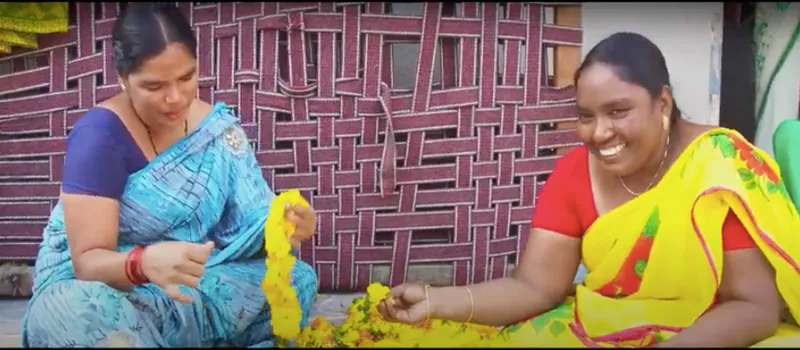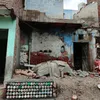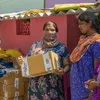From caring for children who lost their parents to COVID-19 to giving them psychosocial support – the top Social Stories of the week
This week, SocialStory identified stories of providing mental and survival support to children amidst COVID-19. We also shared the plight of sex workers in India during the pandemic.
While SOS Children’s Villages has taken to supporting children whose parents have been impacted by the COVID-19 pandemic, World Vision India shared its knowledge on how to provide psychosocial support to children during the pandemic.
On International Sex Workers Day, we spoke to sex worker communities from different parts of India to understand their situation during these trying times, who shared some of their biggest challenges.
Meanwhile, John Benjamin Nadar is among those COVID warriors who continue to distribute food for the poor during the pandemic.
Here are the top Social Stories of the week:
NGO caring for children who lost their parents to COVID-19

Children with their mother at SOS Children's Villages Of India
SOS Children's Villages protects children who lost either one or both parents to the COVID-19 pandemic. It focuses on providing children with a loving home, keeping their families together, and supporting young people to become independent. At present, the NGO has over 6,500 children living in 440 family homes inside 32 SOS Children’s Villages in 22 Indian states and UTs. It directly impacts 28,500 children every year with more.
During the COVID-19 pandemic, the NGO turned towards aiding severely-impacted children by providing long-term and short-term care. To date, the NGO has extended its care to over 95 children who lost their parents to the deadly virus.
I tell former sex workers to speak up for themselves and not be afraid to face society

Rasheeda (left) with her friend Mastani who introduced her to the social welfare organisation and helped rehabilitate her
My husband abandoned me with two small children to care for. We lived in Ponnur — a small town near Guntur, Andhra Pradesh — and I had no source of income. We were living in very dire circumstances. A friend of mine then came and offered me help and a small place to stay.
A few days later she asked me if I was interested in doing sex work to help make ends meet. She convinced me that they were all doing this to make ends meet.
Things were very challenging but I had two children to feed. There were times when I was forced to go with not just one but two men, and I had to do whatever they asked me. Very often, I would not get paid for the time I spent with them. They would just ask me to leave, and I would return home empty-handed.
In this week's Survivor Series, Rasheeda speaks about how she was forced into sex work but is now educating other women on their rights. Read on.
Why India’s sex worker communities need support to survive the COVID-19 pandemic

Distribution of ration kits by Saheli Sangh
When they heard of the virus, many of the sex worker communities in India were taught how to practice hygiene measures like the usage of masks, sanitisers, and the importance of handwashing. But while they were getting the hang of it, the nationwide lockdown was declared, which severely impacted their livelihoods.
According to the National AIDS Control Organisation (NACO), there are about 800,000 sex workers in India whose livelihoods were impacted due to the lockdown.
But like most NGOs working in such difficult times, organisations like SANGRAM, Sangama, and Saheli Sangh, along with unions and collectives, have been aiding members and non-members in their vicinity to help them cope with the pandemic.
This man from Mumbai has been feeding the poor during the pandemic

John Benjamin Nadar with the kids living under the flyover
John Benjamin Nadar and his friends started an initiative called ‘Serving Humanity,’ a team of seven, which distributed about 150 meal packets earlier. It has now distributed over 40,000 food packs and has reached more than 3,500 families.
“Apart from meal distribution, we also distributed rations kits to many places like Diva, Kalva, Versova, Tribal Area, Bhandup West, Mahul, and Vikroli, among other places in Mumbai,” said John.
While John wants to continue the drive daily, he also wants to open a centre where children can be educated and adults can be upskilled in various activities like candle-making and other smaller activities.
How to help children cope with COVID-19 driven anxiety

In March 2020, the Government of India announced the complete closure of schools to curb the spread of the disease. Children were isolated at home, with a complete shift in their lives and routines. Many had to adapt overnight to new ways of learning, while others with no access to online resources to connect with their peers or with their schools, were completely cut off.
According to Dr P Carel Joseph, Director - Health, World Vision India — an organisation working with underprivileged children — says, “It is important to filter any news the children hear. Ensure they only access what is essential for them. However, it is important to assure children with facts, especially about COVID-19.”
In a conversation with SocialStory, Dr Joseph talks about how psychosocial support is needed to help children deal with anxiety fuelled by the COVID-19 pandemic.
Edited by Suman Singh









![[Funding alert] SaaS platform Fieldproxy raises Rs 2 Cr in seed round](https://images.yourstory.com/cs/2/e641e900925711e9926177f451727da9/FeildproxyTeamPicture-1630910048710.jpg?mode=crop&crop=faces&ar=1%3A1&format=auto&w=1920&q=75)